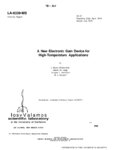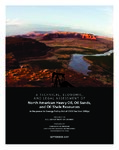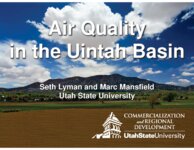TO
| Title | Date | Subject | Description | ||
|---|---|---|---|---|---|
| 1 |
 |
2011 Unconventional Fuels Conference - Welcome/opening remarks | 2011-05-17 | unconventional fuels; opening remarks; coal; oil shale; power generation; transportational fuel infrastructures; carbon capture; agenda | Presentation given at the 2011 University of Utah Unconventional Fuels Conference. |
| 2 |
 |
2012 Unconventional fuels conference introduction | 2012-05-15 | unconventional fuels; computational simulation and pilot-scale experiment; unconventional resources; emissions minimization; CO2 regulation; CO2 coal research | Presentation given at the 2012 Unconventional Fuels Conference. |
| 3 |
 |
A bibliography of thermal methods of oil recovery | 1965-03 | Thermal methods; Oil recovery; Bibliography; Bureau of Mines Petroleum Research Center; Thermal methods of oil recovery | The Oil Recovery Committee, Independent Petroleum Association of America, in response to requests and in recognition of expanded interest in the application of thermal methods of oil recovery, has sponsored the compilation of the following bibliography, with literature and patent references, and aut... |
| 4 |
 |
A brief history of early mineral exploitation in the Uinta Basin | 1964 | Uinta Basin; Mining; Uintah Valley; Indian Reservation; Meeker; Utah; History of early mineral exploitation; Uintah Reservation; Gilsonite; Coal; Copper; Iron; Oil shale; Ozocerite; Wurtzilite; Oil; Asphalt; Ashley Creek; Hatchtown; Vernal; Fort Duchesne; Ouray Subagency | Early mining activities in the Uinta Basin can be summarized by saying that they included mining for gilsonite, coal, copper, iron, oil shale, ozocerite, wurtzilite, and oil and asphalt (under the placer mining laws). Of these minerals only coal and gilsonite were produced in commercially significan... |
| 5 |
 |
A comparison of biomakers in gilsonite, oil shale, tar sand and petroleum from Threemile Canyon and adjacent areas in the Uinta Basin, Utah | 1992 | Gilsonite; Oil shale; Tar sand; Petroleum; Threemile Canyon; Uinta Basin; Utah; Green River; Hopane; Sterane; Carotenoid biomarkers; Alginite; GC/MS; Ion fragmentograms; Biodegradation; Maturation; Oil shale outcrops; Bluebell-Altamont; Red Wash field; Bitumen; Pyrolysis; Py-GC/MS; Curie-point pyrol... | Relationships between gilsonite, oil shale and petroleum were investigated by comparison of hopane, sterane and carotenoid biomarkers. Samples examined were alginite, gilsonite, oil shale, tar sand and petroleum. Comparison of peak distributions in specific GC/MS ion fragmentograms of the above hydr... |
| 6 |
 |
A fully integrated Kinetic Monte Carlo/Molecular Dynamics approach for the simulation of soot precursor growth | 2002 | Polycyclic aromatic hydrocarbon polymerization; Soot; KMC/MD; Kinetic Monte Carlo/Molecular Dynamics; Particle growth; Atomic-scale structure; Molecular Transformations; KMC; MD; Simulation; Kinetic mechanism | The emphasis in this paper is on presenting a new methodology, together with some illustrative applications, for the study of polycyclic aromatic hydrocarbon polymerization leading to soot, widely recognized as a very important and challenging combustion problem. The new code, named fully integrated... |
| 7 |
 |
A geochemical survey in the Santa Barbara Channel and its relationship to subsurface heavy-oil deposits | 1987-11-02 | geochemical survey; Santa Barbara Channel; subsurface heavy-oil deposits; oil fields | A geochemical survey was conducted in a part of the Santa Barbara Channel that contains three oil fields: Hondo, Pescado, and Sacate. The fields, especially Hondo, contain substantial reserves of low-gravity oil (14-26° API) in the fractured Monterey Formation of middle Miocene age. The light hydro... |
| 8 |
 |
A heavy-oil case study on a single well in Venezuela, MFM-7s, using cores and logs | 1987 | heavy-oil case study; Venezuela well; MFM-7s; well cores; well logs; heavy-oil reservoirs | Planning for optimum production from heavy-oil reservoirs requires a deep understanding of their geological and petrophysical characteristics, synthesized from intermittent core and continuous log data. In this paper the study developed for the MFM-7S well, operated by S. A. Meneven in the Faja Petr... |
| 9 |
 |
A market assessment of heavy oil, oil sands, and oil shale resources | 2011-03-10 | unconventional fuels; market assessment; developing domestic heavy oil, oil sands, and oil shale resources; preliminary infrastructure needs | A presentation given at the Unconventional Fuels from Oil Shale and Oil Sands Project Review Meeting on March 10-11, 2011. |
| 10 |
 |
A model of hydrocarbon generation from type 1 kerogen: Application to the Uinta Basin, Utah | 1986-12-18 | Pyrolysis; Green River shale; Petroleum; Utah; Uinta Basin; Kerogen; Oil; Eocene; Type I kerogen; Hydrocarbon generation; Oil generation; Gas generation; Kinetics | The Uinta Basin in northeastern Utah provides an ideal setting to study the evolution of kerogen to petroleum. Oil shale rocks of the Eocene-age Green River Formation outcrop extensively at the southern edge of the synclinal basin. The same rocks are also found at depths of 3650 m in the deepest par... |
| 11 |
 |
A new electronic gain device for high-temperature applications | 1976-07 | This report deals with a new integrated thermionic device capable of withstanding ambient temperatures in excess of 500°C, which eliminates the problems associated with earlier versions. The history of the ITC (Integrated Thermionic Circuit) is traced along with Los Alamos Scientific Laboratory (LA... | |
| 12 |
 |
A proposal to evaluate oil-impregnated sandstone in the Uinta Basin, northeast Utah; made to the Energy Research and Development Administration by Utah Geological and Mineral Survey | 1976-06-15 | Petroleum; Utah; Uinta Basin; Oil; Bitumen; Ore waste radiation; Oil-impregnated sandstone; Deposits | Most of the known petroleum resources in the form of oil-impregnated in the United States occur in Utah. It is estimated that over ten billion barrels of petroleum occur in such deposits in the Uinta Basin alone (Ritzma, 1973; Campbell, 1975). Four deposits among the twenty identified in the Uinta ... |
| 13 |
 |
A proposed oil extraction and strip-mining project | 1974-08-23 | The Utah Division of Oil & Gas Conservation, 1588 West North Temple, Salt Lake City, Utah, has received an application from the Sohio Petroleum Company to conduct mining operations for the removal and processing of the commercially minable deposits of bituminous sands on the following described land... | |
| 14 |
 |
A reconnaissance evaluation of heavy hydrocarbons in the Tar Sand Triangle | 1985-08 | Utah; Tar Sand Triangle; Permian White Rim Sandstone; Moenkopi Formation; Cedar Mesa Sandstone; Chinle Formation; Oil; Oil-impregnated sandstone deposit; In-situ; Heavy hydrocarbons; Triassic; Jurassic Navajo Sandstone | The Tar Sand Triangle encompasses about 200 square miles in southeastern Utah. The area consists of rough, mountainous terrain, with a climate that varies from semiarid to arid. Sedimentary rocks exposed in the area range from Permian Cedar Mesa Sandstone to the Triassic(?)-Jurassic Navajo Sandstone... |
| 15 |
 |
A report to Idaho National Engineering Laboratory | 1987 | Three Texas lignites (Jewett, Big Brown, and Bastrap), weathered and fresh tar sand, weathered and fresh Gilsonite and weathered oil shale have been studied using Py-MS (pyrolysis mass spectrometry) and further analyzed using the SIGMA program. | |
| 16 |
 |
A solvent extraction process for tar sand | 1987 | Sunnyside, Utah; Tar sand; Solvent extraction; Bitumen; East central Utah; Ore; Hydrocyclones; Pentane-deasphaltening; Rotary kiln steam strippers; Oil | A process has been investigated for solvent extraction of bitumen from Sunnyside, Utah, tar sands. The Sunnyside deposit, in east central Utah, has 1 to 2 billion barrels of geological reserves with a richness of 6 to 10 wt% bitumen. In this process, the ore is crushed and the bitumen is dissolved f... |
| 17 |
 |
A sulfur isotopic study of Uinta Basin hydrocarbons | 1973 | Sulfur isotope analyses of tar from oilimpregnated sandstones, crude oils and solid hydrocarbons from the Uinta Basin (Tertiary), Utah, show wide variations, but all are heavier than the troilite sulfur isotopic standard. The data range from +2.7 to 30.3 permil and sulfur contents are low, usually l... | |
| 18 |
 |
A technical, economic, and legal assessment of North American heavy oil, oil sands, and oil shale resources: In response to Energy Policy Act of 2005 Section 369(p) | 2007-09 | Oil sands; Oil shale; Heavy oil; Energy Policy Act; 2005; Climate Change; Petroleum; Oil Cost; United States; North American heavy oil; Utah Heavy Oil Program; UHOP; World economic development; Energy; Canadian oil sands; Unconventional resources ;Technical; Economic; Legal assessment | Against the backdrop of world population growth, rapid economic expansion in the world's most populous countries, challenging political climates in many oil-producing nations, and the specter of climate change, worldwide energy consumption is projected to increase from the 2004 level of just over 40... |
| 19 |
 |
A unified approach to the various formulations of the one-dimensional-turbulence model | 2010-01 | One-Dimensional Turbulence model; ODT; Stand-alone ODT models; Predicting turbulence statistics; Nonreacting flows; Reacting flows; Governing equations; Turbulent flow field; Linear Eddy Model; Eddy events | The One-Dimensional Turbulence (ODT) model has been successfully applied as a stand-alone model for predicting turbulence statistics in both nonreacting and reacting flows. There are several formulations of the model in the literature, and most of the variable-density formulations do not clearly dis... |
| 20 |
 |
Accelerating deployment of retrofitable CO2 capture technologies through predictivity: (Simulation, verification, validation / uncertainty quantification) - 2010 Annual report (for year 1 of 3) to DOE NNSA from The University of Utah | 2011 | CO2; CO2 capture technologies; predictivity; fossil-fuel utilization | There is an ever increasing national awareness that an effective, sustainable energy future must include fossil-fuel utilization that deploys cost-efficient technologies (both new and retrofit) that significantly improve energy efficiencies and reduce CO2 emissions over existing electric power and t... |
| 21 |
 |
Air quality in the Uintah Basin | 2013-05-07 | ICSE; Unconventional fuels; Air quality; Air pollution; Uintah Basin; Ozone; Pollutant concentrations; Inversions; VOC; Utah | Presentation given at the University of Utah Unconventional Fuels Conference, Salt Lake City, Utah, May 7, 2013. |
| 22 |
 |
Ambient froth flotation process for the recovery of bitumen from tar sand | 1984-01-10 | Patent; Bitumen; Tar sand; Admixing raw tar sand; Tar sand slurry; Milling; Froth flotations; Ambient temperatures; Concentrated bitumen tar sand product; Oil; Recycle and recovery | A method for upgrading the bitumen content of tar sands, wherein a raw tar sand slurry admixture of tar sands, water, collectors, and dispersing/wetting agents is milled; conditioned and then separated by a series of froth flotations at ambient temperatures from about 2.degree. C. to about 25.degree... |
| 23 |
 |
America's oil shale: A roadmap for federal decision making | 2004-12 | Oil shale resources; Oil supply; U.S. economy; Domestic oil shale; Oil production; Multi-agency Federal oil shale plan; Energy; Interior; Defense; Treasury; America; Import dependence; Natural gas by-products; Oil price; Oil supply and demand | The President and the Department of Energy have determined that increasing liquid fuels supply from domestic sources is an important national objective. America's rich and concentrated oil shale resources, containing as much as 2 trillion barrels of potential oil supply could make a major contributi... |
| 24 |
 |
America's strategic unconventional fuels: Oil shale, tar sands, coal derived liquids, heavy oil, CO2 enhanced recovery and storage | 2007-09 | Colorado; Wyoming; Oil shale development; In-situ; Environmental impacts; Water supply issues; Economics; Socio-ecomonic impacts; Infrastructure; Market challenges; Programmatic Environmental Impact Statement; PEIS; RD&D; BLM; Leasing program; Federal lands; Oil Shale Program Plan; Energy Policy Act | The Task Force members from Colorado and Wyoming have expressed legitimate concerns about the timing and sequence of Federal efforts to promulgate commercial leasing regulations for oil shale development and initiate leasing activity. They are concerned that the current state of development of surfa... |
| 25 |
 |
American gilsonite: Mining solid hydrocarbon | 1985 | Gilsonite, a soft asphaltite found in near-vertical veins over a large area around Bonanza, Utah (Fig. 1), is mined by American Gilsonite Co. (AGC) using air-powered chipping hammers instead of explosives and mechanical equipment. A vacuum air lift moves 100,000 st/yr of ore to the surface through b... |
